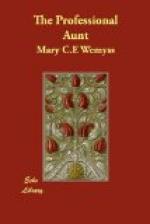“Like Cousin Penelope,” I said.
We arrived at the shop where the coat and skirt were to be had, and Pauline, having admired the horse and thanked the cabman, and the commissionaire, who held his arm over a perfectly dry wheel, followed me into the shop. She admired everything as she went through the different departments, and apologized to the shop walkers for not being able to buy everything; but she lived in the country, and although the things were lovely, they would be no use to her — dogs on her lap most of the day, and so on.
Everyone looked at Pauline; and old ladies, to whom she always appeals very much, put their heads on one side, as old ladies do when they admire anything very much, anything which reminds them of their own youth, and smiled. Old ladies have this privilege, that when they arrive at a certain age, they are allowed to think they were beautiful in their youth, and to tell you so. It is a recognized thing, and one of the recompenses of old age. We all know that every one had a beautiful grandmother — one at least; and if a portrait of one grandmother belies the fact, then there is the other one to fall back upon, of whom, unfortunately, no portrait exists, and she was abs — so — lute — lee lovely!
The coat and skirt were found and eagerly compared with the illustration, and Pauline turned to me and said with a triumphant ringing her voice: “It wasn’t an exaggeration. I knew it wouldn’t be. Mother has dealt here for years.”
Then we went upstairs to try it on. In a few minutes Pauline had discovered that the fitter was supporting her deceased sister’s husband and six children, the eldest of whom wasn’t quite right and the youngest had rickets. She was so distressed that she didn’t want the back of her coat altered, the woman already had so much to bear. But I prevailed upon her to have the alteration made regardless of the woman’s domestic anxieties. I felt sure it would make no difference. But I cannot help feeling that Pauline’s visit to that shop did make a difference to that poor woman, if only for a few moments in her life. And I think those children’s lives were made happier too; but it is difficult to get Pauline to talk of these things.
Then we went to the shoemaker, and Pauline told him all about the widower bootmaker, and of her scruples about having boots made by any one else. The bootmaker evidently thought that a foot like Pauline’s was worthy of a good boot and Pauline said there were occasions on which one had to sink one’s own feelings. She was scandalized at London prices, and told the man so. “But of course it means higher pay for the men, so it’s all right.”
On our way home I said to Pauline that I couldn’t understand why she was so economical — ready-made coats and skirts, and afraid of paying a fair price for good boots! Was her allowance smaller than it used to be? She got pink and didn’t answer. I determined she should, and at last she did.




